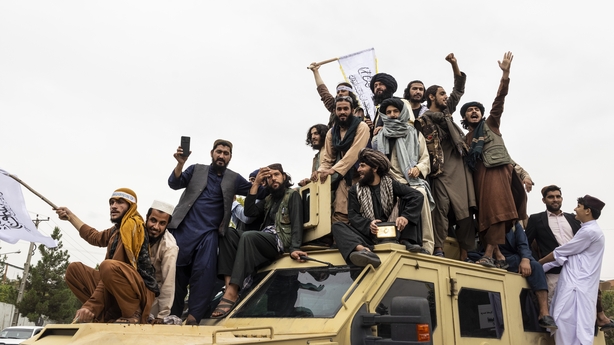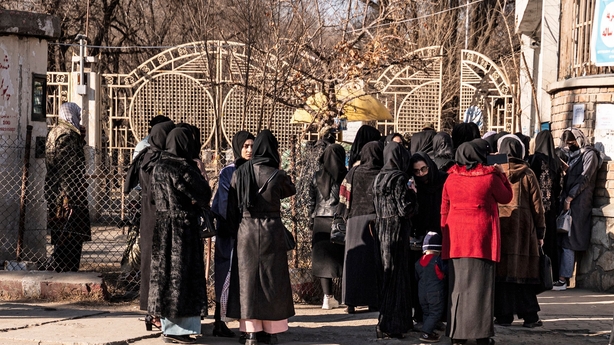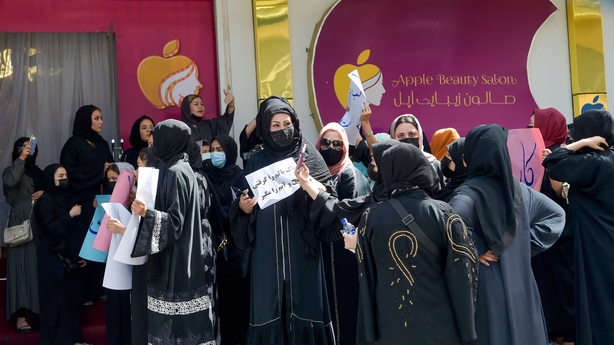It is two years since the Taliban took over Afghanistan in the wake of the chaotic withdrawal of US troops.
Since then, the extremist group has unleashed an unyielding assault on human rights, particularly those of women and girls. The international community has proved powerless to halt it.
A group of UN human rights experts has said that the Taliban's policies have resulted in "a continuous, systematic and shocking rescinding of a multitude of human rights, including the rights to education, work, and freedoms of expression, assembly and association".
The experts cited reports of summary executions, torture and arbitrary detention.

The hardest hit were women and girls, ethnic, religious and other minorities, people with disabilities, displaced persons, LGBTQ+ persons, human rights defenders and other civil society actors, they said.
Girls are forbidden from attending school beyond primary level in Afghanistan, while women are banned from the workplace following Taliban-issued edicts.
In April, the UN lost its exemption from the ban, forcing all female UN staff in the country to work from home.
The United Nations calls it "gender apartheid". But it is short on solutions as the Taliban’s authority grows.
Asked by RTÉ News what the Secretary General believes the international community should do to compel the Taliban to change course, his spokesperson, Stéphane Dujarric, said member nations should come together to apply pressure on the de facto authorities.

"What will compel them is a united front from the international community and keeping the issue first and foremost in the spotlight," Mr Dujarric told RTÉ News.
But, he added, those who have influence and direct lines of communication to the Taliban needed to use them to the benefit of women and girls in Afghanistan.
Women’s rights groups in Afghanistan accuse the international community of abandoning them.
"We are neglected because we are not important and we do not weigh much on the world stage," Shahir Zahine, a spokesperson for Development and Humanitarian Services for Afghanistan, an NGO, said.
Afghan women are right to think nobody cares about them, Heather Barr, co-director of the Women's Rights Division at Human Rights Watch, said.
We need your consent to load this rte-player contentWe use rte-player to manage extra content that can set cookies on your device and collect data about your activity. Please review their details and accept them to load the content.Manage Preferences
Or, at the very least, nobody cares enough "to do something about it", she told RTÉ News.
Ms Barr added that the recent closure of beauty salons was "alarming" and much more ominous than it might seem, because in a society where domestic violence is rife, "beauty salons are one of the only places outside the home where women can congregate and get some support".
It also indicates that the Taliban is closing down access for women to the private sector, she said.
The international response over the past two years is "not one that has given its best effort", she said.
But the world lacks leverage over the Taliban rulers, according to Michael Kugelman, director of the South Asia Institute at the Wilson Center, a Washington-based thinktank.
"The top Taliban leadership, the mullahs in Kandahar that hold supreme power, can't be influenced by the possibility of more aid and recognition if they agree to let girls back to school and women go back to work. That's because they don't care about getting aid or recognition," he said.
But some members of the Taliban have been pushing for international recognition of their regime, something that the UN says is not on the table.
Indeed, the current envoy to the United Nations was appointed by the previous administration and does not represent the de facto authority in Kabul. The Taliban's request to have their own envoy recognised has not been met.
Asked by RTÉ News how long he will be able to represent Afghanistan at the United Nations, given that the Taliban's power is growing, Naseer Faiq, chargé d'affaires of Afghanistan's former government, said he would continue to work within the UN system for the people of Afghanistan.

"Our voice is the voice of people, the voice of those who have been stifled in Afghanistan, whose rights have been taken and we have to continue until we reach a political settlement," he told RTÉ News.
But Mr Kugelman argues that leaving the Taliban regime unrepresented is not tenable.
"It’s not fair for the Afghan people that they have no formal voice at the UN to represent them in talks on critical global issues such as climate change that disproportionately impact Afghanistan and Afghans," he said.
One way forward, he said, could be for the UN to allow a Taliban leader to represent Afghanistan in negotiations on issues that pre-date the Taliban takeover, like climate change.
"Why not invite the Taliban to participate in this capacity at the next UN climate summit? And if it doesn’t work out, at least the UN leadership can say it tried," he added.
But women rights groups believe that any move towards recognition risks rewarding the Taliban for their abuse of women's rights.
The focus instead should be on holding members of the Taliban accountable for their crimes, Ms Barr said.
"We should be looking towards the International Criminal Court to make Afghanistan the priority," she said.
"Arrest warrants for some members of the Taliban may change the dynamic a little bit," she said.
"I think the whole thing illustrates how little political capital has been put into defending the rights of women and girls, and we should all worry about that, not just Afghan women and girls," she added.







